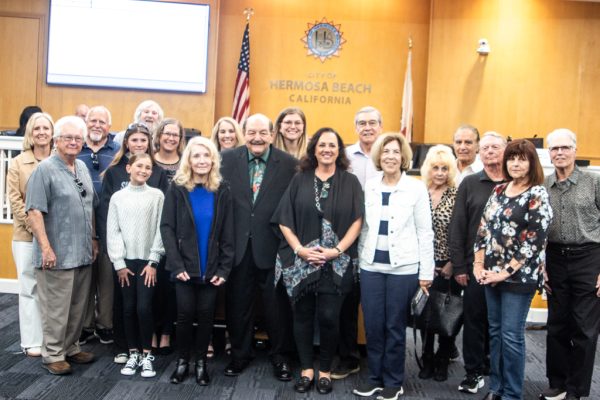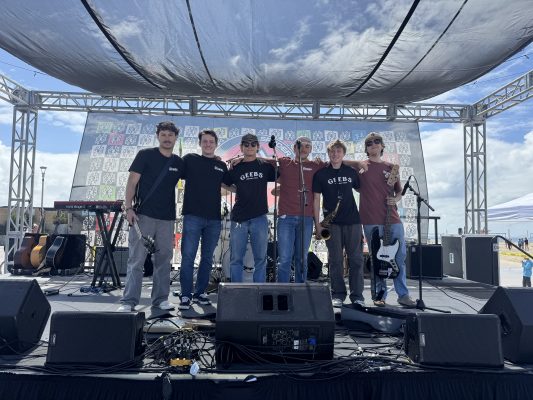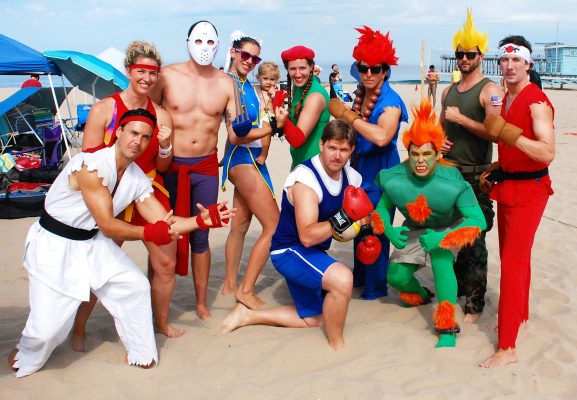‘I drink’
Lissner has said he is not a teetotaler.
“I drink,” he said.
He said he protests liquor licenses because he firmly believes the saturation of alcohol-serving establishments diverts city law-enforcement resources.
“The question does come up at liquor license hearings – why are you protesting this? I am a resident in Hermosa Beach, and my concern is that alcohol establishments downtown eat up our resources, and other areas are not getting what they need,” he said.
Lissner estimates the cost of policing the Pier Plaza, the city’s largest nightlife concentration, at about $1.5 million a year, not counting the cost of prosecuting assaults, DUI and other crimes. He arrived at the figure by taking the number of officers who work in the field, subtracting 10 percent for vacation and leave time, and dividing that total into the full Police Department budget.
The city’s Finance Department places the cost at about $500,000 a year, based on police salaries.
“We don’t have a municipal swimming pool, we don’t have what we should have, basically,” Lissner said. “I don’t hear people tell me they can’t find a drink in Hermosa.”
Weiss said Lissner fails to take into account the city’s revenues from sales and property taxes, and the revenue stream from parking meters and tickets, especially at night.
“The only businesses open after 6 o’clock are bars and restaurants,” he said. “If you look at the downtown’s history, we would be a ghost town without bars and restaurants.”
Crime question
Other critics of the Hermosa nightlife point to a report “Reducing Alcohol-Related Harms in Los Angeles County,” prepared by the Los Angeles County Department of Health, which linked a high density of businesses serving or selling alcohol with higher rates of violent crimes.
In a countywide comparison of 119 cities, unincorporated areas and sections of Los Angeles, Hermosa Beach was found to have the fourth highest concentration of alcohol-serving establishments per resident, and was tied for seventh out of 119 for highest concentration of stores selling alcohol, according to the report.
Countywide, Hermosa ranked low in alcohol-related harm. The city was in a three-way tie for 73rd in per-capita violent crime, and near the bottom at 103rd in alcohol-related deaths. Hermosa was in an eight-way tie for 36th in vehicle crashes per resident.
But Hermosa had 3.5 violent crimes per 1,000 residents annually, more than the 3.1 in Redondo Beach, 2.3 in Torrance, 2.1 in El Segundo and 1.6 in Manhattan Beach.
The report’s authors wrote that the density of alcohol outlets “varies widely” among cities and communities across the county” with a higher density of alcohol-serving bars, nightclubs and restaurants in affluent communities including the beach cities.
The authors suggest “actions to limit alcohol-outlet density,” including urging local governments and communities to comment on or protest liquor licenses.
“The reason we have the problems we have is that we have a certain critical mass” in the downtown area, Lissner said. “We don’t achieve critical mass elsewhere in town, but we have other bars. Crazy stuff occurs where they are crowded together.”
He is not alone in this view. Many people living near the downtown have complained about minor crimes and disturbances, people urinating in public and waking them up with their carousing on their way from the downtown establishments around weekend closing times.
Community support
Lissner also has a good deal of community support, evidenced by the successful petition drive for his ballot initiative, and his successful fight to stop Sharkeez, the Pier Plaza nightlife centerpiece, from expanding as it was being rebuilt after a fire in 2006.
In that battle, Lissner qualified a ballot referendum that would strike down a city ordinance that was key to the expansion. A majority of the then-City Council agreed to oppose Lissner, but no council member came forward to write an opposing ballot argument, and in the end the council changed its ordinance rather than see the matter decided at the polls. It was a public showdown, and Lissner prevailed.
And the general view that Hermosa serves too much alcohol is shared by many. When upper Pier Avenue was being rebuilt two years ago with wider sidewalks, stately palms and numerous decorative features, nearby residents convinced the City Council to ban sidewalk dining out of concern that the nightlife vibe of the Plaza would begin creeping uphill.
City struggles
The City Council spends much of its time and effort struggling to find ways to limit rowdiness and noise associated with the downtown nightlife, including limiting new establishments, imposing earlier closing times, and refraining from fighting restaurants that want to serve beer and wine as long as they close at 10 p.m. instead of becoming de facto late-night bars.
And the nightlife has mellowed significantly in recent years, at least by some measures. Several years ago the city Planning Commission came down hard on three nightspots, imposing penalties including earlier closing times. Since then, the commission has held yearly reviews of the nightspots and found no need to single out any of them for penalties.
Many civic leaders have cited greater self-policing from the owners of downtown nightspots, and a police “surge” to quell revelry in downtown residential neighborhoods.
Hermosa Councilman Jeff Duclos called the Lissner issue “a complicated one.”
“He’s exercising his right as a resident, and he believes this to be a key issue, that the alcohol saturation, and its negative impacts, should be moderated in some way. That remains a central public concern too. He’s speaking to a core issue in our community, whether we agree with his approach or his tactics,” Duclos said.
“At the end of the day, I think what he tries to do is keep that at the forefront of the public’s agenda. I probably disagree with much that he does, but he believes firmly in what he is doing…. Often people forget, he’s not working in a vacuum, he has a lot of support. As disastrous as that [ballot initiative] petition was, a lot of people signed that petition.”
Dogged pursuit
Lissner, an avid sailor who wears muted, long-sleeve Hawaiian shirts, engages in arguments in a soft-spoken, methodical, unemotional manner.
He said he is trying to hold the line against the ABC granting more and more licenses, and the City Council giving nightspots what he sees as too much leeway.
“What people did in Hermosa Beach is they would hire an executive chef, put up a nice menu with wonderful entrée items, and said, ‘We are a restaurant,’ And the council gave them [approval for] 2 a.m. hours, just like a restaurant doesn’t need.”
Lissner said a business with a restaurant permit from the city and a restaurant liquor license from the ABC should not be allowed to function as bars, which require separate permissions. He has said late hours are typically for drinking, not eating.
He believes the city should roll back closing times, with no more 2 a.m. closures on weekends, pointing to residents’ frequent concerns about noise and rowdiness as the closing-time crowd hunts down taxicabs or their cars to all get out of town at once.
“My idea is to kick them out earlier, when they have an opportunity to go somewhere else by cab and be served prior to last call, and we won’t have to police them until 4 a.m.,” Lissner said.
If Lissner is dogged in his pursuit of a more limited city nightlife, that perseverance has been seen in other areas as well.
In 2000 he was recognized by the California First Amendment Coalition for a slow-but-steady fight to keep police departments in California from charging more than their own costs for reports on crimes and traffic accidents requested by members of the public.
And his belief that the City of Hermosa Beach squirrels away too much money in its investment fund – rather than loosing it into the economy and using it to help the cash-strapped public schools – has led him to spend hours on the phone with municipalities across the country, digging into the niceties of their investment funds.
He points out that Hermosa’s investment fund swells to about $1,000 per resident, and he said you might be surprised to find that’s on the low side. Beverly Hills holds some $8,300 per capita in its portfolio, he said.
“Just in California there is probably a trillion that is out of circulation, and that would be quite a stimulus,” he said.
He said he recently spent two hours on the phone to New York, asking investment fund questions.
“I’ve called all over the country,” he said.
The Lissner saga took a strange twist in 2003, when he was convicted of two misdemeanor counts stemming from an incident in which his attorney said he opened the door of an empty police car parked on the Pier Plaza.
A jury found Lissner guilty of tampering with a vehicle and disobeying an officer, both violations of the state’s vehicle code, following a brief trial in Superior Court.
Lissner did not speak to reporters about the incident.
‘NIMBY’
Tiffany Rau, 46, a mother of a teenage son and daughter whose job is public outreach and communications for energy producers, likes to relax and meet friends at the venerable North End bar, which stands within doors of her home. She hopes that Lissner’s influence is leavened by those who do not see things his way.
“I guess I’d say that he’s kind of a classic NIMBY [Not In My Back Yard],” she said.
“He’s taken on that role in the community, and it’s not a bad thing, as long as other people in community are listened to. I love the town, it’s a great eclectic mix of people, and we should be tolerant of each other,” Rau said. “And he’s not.”
She described the North End as “good neighbors” and “a bar that also has really good food, and is a social outlet for people.”
She said the voter initiative Lissner launched would have hamstrung nightspots, by raising a business license tax, in the most radical case, from about $3,000 to $640,000 a year for a nightspot, according to a city analysis.
“I don’t think one person ought to impact how everyone spends their time,” Rau said. “I know the parental group and the people-who-go-to-bars group, and we can all live in harmony just fine. That’s what Hermosa is all about.”
Roger Bacon, owner of the Ralph’s shopping center at the prominent corner of Pacific Coast Highway and Aviation Boulevard, said Lissner “did the city of Hermosa Beach a disservice” by pushing his ballot initiative, which helped push the City Council to promote its competing ballot measure, which resulted in some tax increases for nightspots.
Bacon said he was rallying opposition to the city’s tax-raising measure, but once Lissner raised the possibility of more extreme tax increases, opposition to the city’s plan vanished.
“Then he changed his mind,” Bacon said. “He admitted he made it too expensive for those folks.”
50-50
Alan Benson, a former City Council candidate whose platform included further limits to Hermosa nightlife, said the county Health Department report “confirms what I knew, or what Jim Lissner knew. The report said cities that have a higher density of alcohol outlets have more violent crime. They are talking about rape, aggravated assault and robbery.”
Benson said he pushes for greater enforcement of a “50-50 rule” that is contained in many liquor licenses, and some city permits, requiring a restaurant to make at least half its money from food, separating it from a bar, which operates under a different type of ABC license.
And, he said, it’s important to be prudent in questions over liquor licenses and city permits for restaurants, because the permissions can remain with a business after its original owner, who might be a trustworthy neighbor, is gone.
“I’m not anti-alcohol per se, but I’m paying taxes, and the money is being pulled away to run a [downtown] venue. That venue gets free police and fire, and costs attorneys’ fees if people sue our city,” Benson said. “And the city shouldn’t be making money off people’s misery, if they are beaten up, stabbed, raped and robbed, and we are having that more than they do in other cities.”
Benson said he was a Zeta Pi fraternity president in “Animal House”-style digs at Otterbein College in Ohio.
“We had beer parties in our place, but obviously the next day, the place was trashed,” he said.











